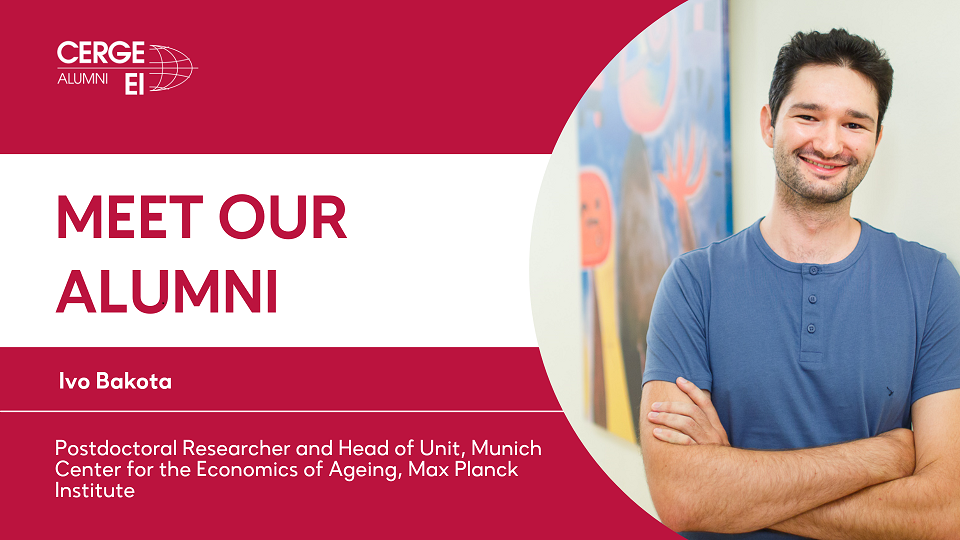Ivo Bakota, our 2020 PhD in Economics graduate, is a Postdoctoral Researcher and the Head of Unit at the Munich Center for Economics of Aging, Max Planck Institute for Social Law and Social Policy. What does he like about his work and what projects is he currently working on?
It has been three years since you became a Postdoctoral Researcher at the Munich Center for Economics of Aging, Max Planck Institute for Social Law and Social Policy. How would you evaluate your three years in this position?
It’s been a bit longer than three years actually. I also often have a feeling that it was much shorter than that. Time really does fly. Reflecting on that time, I think that it has been a weird period for everyone due to the pandemic. Despite that, I tried to make the most of it. I progressed a lot with my past project, I met a lot of smart and interesting people, and I learned a lot.
You became the head of the “Life-Cycle Decisions” unit at Max Planck. Can you tell us more about this unit’s projects?
We’re starting our new EU-grant-funded project called Baby-Boomer Future. We’re looking beyond the “pension wave” and studying the “long-term-care” wave for the elderly triggered by the demographic changes (lower fertility rates, longer life expectancy). For example, according to Eurostat’s projections for the EU, the share of people older than 85 will rise sharply in the upcoming decades, while the share of people aged 20-65 will continue declining. This means that the ratio of people potentially in need of care and people who can supply it will rise dramatically.
I find the research not just important, but also very interesting since it involves a lot of different research fields. The care for the elderly is not only provided formally in nursing homes and it is often provided informally by the members of their family, and disproportionately (still) by women. This means that we have to involve a lot of different fields in our research: macroeconomics, game theory, family economics, sociology… Different countries might find a different mix of formal and informal care appropriate for them because of their cultural and demographic peculiarities. All the different forms have their advantages and weaknesses such as government-founded formal care might be expensive, but a lot of elderly people simply cannot afford to pay for private nursing homes or generate additional income. If younger family members provide the care, then this impairs their participation in the labor market, which can be detrimental to the country’s economy.
To me personally, bargaining models used to study these family dynamics are very interesting, because it is the family members who are deciding how the care will be provided and by whom. They are obviously not purely-selfish agents, and they care about other family members as well. We sometimes call this “imperfect altruism”. In this project, we’re working with people who are leading experts in these topics, which gives me an opportunity to learn a lot and it’s very exciting.
What has helped you the most in your work from your CERGE-EI studies?
These things influence us in ways that we often don’t even realize. I definitely improved my technical (e.g. computational) abilities. Perhaps the most important skill that I got was to tackle research questions more structurally and rigorously and to make it more accessible to the potential audience. Studying at CERGE-EI was a unique experience and it gave me new perspectives. As a first-year student, you come to an amazing city abroad and you are thrown into a group of very smart and highly-motivated students from all across the world, and you are all focused on learning the material at a rigorous and high-quality Ph.D. program. This forces you to learn a lot not only about economics but also about social skills and the (initially arcane-looking) world of academia.
What do you like about working in research and what is the most challenging?
I like the excitement of working on something really new and trying to figure out an answer to a question I am personally curious about. I like (economic) modeling too. When you have a complex model, you sometimes discover important linkages and effects that are not obvious if you simply and purely think about the topic straightforwardly and intuitively.
I think the most exciting parts are the most challenging because if you are indeed trying to do something new and novel, there are no guarantees of success or of a quick and timely progress.
What are your future professional plans?
In the short and mid-term, I am looking forward to working on exciting projects here at MEA. I am working on finishing and publishing current projects, which takes a lot of time in the field of economics. I try not to think too much about the long-term, as it is often unpredictable for young people in academia. I am thankful to MEA and Max Planck Society in general, for enabling me to stay in one place for a long time. Unfortunately, this is often a luxury for young academics who face a lot of uncertainty in their early careers. Let’s see what happens next!
